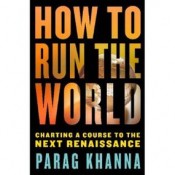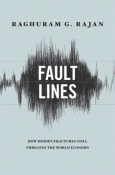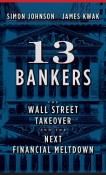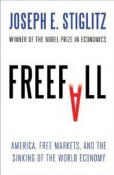Q&A: PARAG KHANNA, Author
Written on January 17th, 2011 |
Aired 01/16/11
PARAG KHANNA is a Senior Research Fellow in the American Strategy Program at the New America Foundation. In 2008, he was named one of Esquire's "75 Most Influential People of the 21st Century," a Young Global Leader of the World Economic Forum, and one of fifteen people on WIRED magazine's "Smart List." Khanna holds a PhD from the London School of Economics, and Bachelors and Masters degrees from the School of Foreign Service at Georgetown University. He is author of the international best-seller The Second World: Empires and Influence in the New Global Order and his newest, How to Run the World: Charting a Course to the Next Renaissance.
Q&A: RAGHURAM RAJAN, Author/Economist
Written on July 22nd, 2010 |
Aired 07/18/10
RAGHURAM RAJAN former chief economist at the IMF author, FAULT LINES: How Hidden Fractures Still Threaten the World Economy Rajan predicted trouble in 2005 and sees income inequality as a root cause.
Q&A: SIMON JOHNSON-Author/Economist
Written on April 22nd, 2010 |
Aired 04/18/10
SIMON JOHNSON, former chief economist at the International Monetary Fund, is currently Professor of Entrepreneurship at MIT's Sloan School of Management and a senior fellow at the Peterson Institute for International Economics in Washington. He is the co-author of STARTING OVER IN EASTERN EUROPE and co-founder of the blog site THE BASELINE SCENARIO with James Kwak, with whom he also co-authored the new book, 13 BANKERS: The Wall Street Takeover and the Next Financial Meltdown.
Q&A: JOSEPH STIGLITZ – Nobel Peace Prize (Economics) & Author – Free Fall
Written on March 10th, 2010 |
Aired 03/07/10
JOSEPH STIGLITZ became a full professor at Yale in 1970 at the age of 27, and in 1979 was awarded the John Bates Clark Award, as the economist under 40 who had made the most significant contribution to the field. He has taught at Princeton, Stanford, MIT and Oxford, and is now University Professor at Columbia University, Chair of Columbia's Committee on Global Thought, and co-founder and Executive Director of the Initiative for Policy Dialogue.
Stiglitz was a member and chairman of the Council of Economic Advisers during the Clinton administration, and later Chief Economist and Senior Vice-President of the World Bank. In 2001, he was awarded the Nobel Prize in economics and he was a lead author of the 1995 Report of the Intergovernmental Panel on Climate Change, which shared the 2007 Nobel Peace Prize.
JOSEPH STIGLITZ is the author of, among other books, Globalization and Its Discontents, Fair Trade for All, Making Globalization Work, The Three Trillion Dollar War: The True Cost of the Iraq Conflict, with Linda Bilmes, and his newest, Freefall: America, Free Markets, and the Sinking of the World Economy.
Q&A: JANE D’ARISTA, Author – REBUILDING THE FRAMEWORK FOR FINANCIAL REGULATION
Written on April 2nd, 2009 |
Aired 03/31/09
JANE D'ARISTA writes and lectures on economics and finance and is a Research Associate at the Political Economy Research Institute at the University of Massachusetts, Amherst. She served as a staff economist for the Banking and Commerce Committees of the U.S. House of Representatives, as a principal analyst in the international division of the Congressional Budget Office and has lectured in graduate programs at Boston University School of Law, the University of Massachusetts at Amherst, the University of Utah and the New School University. Her publications include a two-volume history of U.S. monetary policy and financial regulation.
Author, REBUILDING THE FRAMEWORK FOR FINANCIAL REGULATION
"...barely known among exalted policy-makers, ...progressive economists recognize the originality of her thinking..."
-- William Greider in "Fixing the Fed" (see below)
By William Greider, March 11, 2009, Nation
http://www.thenation.com/doc/20090330/greider/print?+nofollow
Congress and the Obama administration face an excruciating dilemma. To restore the crippled financial system, they are told, they must put up still more public money--hundreds of billions more--to rescue the largest banks and investment houses from failure. Even the dimmest politicians realize that this will further inflame the public's anger. People everywhere grasp that there is something morally wrong about bailing out the malefactors who caused this catastrophe. Yet we are told we have no choice. Unless taxpayers assume the losses for the largest financial institutions by buying their rotten assets, the banking industry will not resume normal lending and, therefore, the economy cannot recover.
